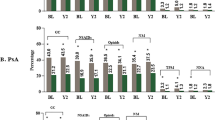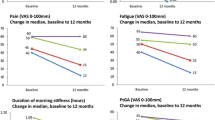Abstract
Introduction
Depression, anxiety, and chronic pain are common comorbidities in patients with rheumatoid arthritis (RA), psoriatic arthritis (PsA), and ankylosing spondylitis (AS) and may substantially impact patient outcomes. We aimed to determine whether these comorbidities were associated with earlier TNF-inhibitor (TNFi) discontinuation.
Methods
This retrospective cohort study using Optum’s de-identified Clinformatics® Data Mart Database 2000–2014 identified patients with RA, PsA, and AS initiating a first TNFi. Depression/anxiety, chronic pain, and opioid use were identified using diagnosis codes and prescription fill data. Cox proportional hazards models were used to compare time to medication discontinuation in patients with or without each of these risk factors and to assess the additive effect of having multiple risk factors.
Results
Among 33,744 patients initiating a TNFi (23,888 RA, 6443 PsA, 3413 AS), depression/anxiety, chronic pain, and opioid use were common, with ≥ 1 risk factor in 48.1%, 42.5%, and 55.4% of patients with RA, PsA, and AS respectively. Each risk factor individually was associated with a 5–7-month lower median treatment persistence in each disease (all p < 0.001). Presence of multiple risk factors had an additive effect on time to discontinuation with HR (95% CI) 1.19 (1.14–1.24), 1.41 (1.33–1.49), and 1.47 (1.43–1.73) for 1, 2, or 3 risk factors respectively in RA. Findings were similar in PsA and AS.
Conclusions
Depression, anxiety, chronic pain, and opioid use are common in inflammatory arthritis and associated with earlier TNFi discontinuation. Recognizing and managing these risk factors may improve treatment persistence, patient outcomes, and cost of care.
Key Points • Depression, anxiety, chronic pain, and opioid use are common in patients with inflammatory arthritis. • In patients initiating treatment with a TNF-inhibitor, depression, anxiety, chronic pain, or recent opioid use are associated with sooner discontinuation of TNFi therapy. • Patients with multiple of these risk factors are even more likely to discontinue therapy sooner. |


Similar content being viewed by others
Data availability
Optum data is governed by a data use agreement and is available to license through Optum.
Code availability
Available upon request.
References
Dickens C et al (2002) Depression in rheumatoid arthritis: a systematic review of the literature with meta-analysis. Psychosom Med 64(1):52–60
Isik A et al (2007) Anxiety and depression in patients with rheumatoid arthritis. Clin Rheumatol 26(6):872–878
Matcham F et al (2013) The prevalence of depression in rheumatoid arthritis: a systematic review and meta-analysis. Rheumatology (Oxford) 52(12):2136–2148
Englbrecht M et al (2019) New insights into the prevalence of depressive symptoms and depression in rheumatoid arthritis - implications from the prospective multicenter VADERA II study. PLoS One 14(5):e0217412
Kamalaraj N et al (2019) Systematic review of depression and anxiety in psoriatic arthritis. Int J Rheum Dis 22(6):967–973
Zhao S et al (2018) The prevalence of depression in axial spondyloarthritis and its association with disease activity: a systematic review and meta-analysis. Arthritis Res Ther 20(1):140
Park JS et al (2019) Impact of ankylosing spondylitis on depression: a nationwide cohort study. Sci Rep 9(1):6736
Freire M et al (2011) Prevalence of symptoms of anxiety and depression in patients with psoriatic arthritis attending rheumatology clinics. Reumatol Clin 7(1):20–26
Shen CC et al (2016) Risk of psychiatric disorders following ankylosing spondylitis: a nationwide population-based retrospective cohort study. J Rheumatol 43(3):625–631
Wolfe F et al (2020) All-cause and cause-specific mortality in persons with fibromyalgia and widespread pain: an observational study in 35,248 persons with rheumatoid arthritis, non-inflammatory rheumatic disorders and clinical fibromyalgia. Semin Arthritis Rheum 50(6):1457–1464
Atzeni F et al (2015) Pain in systemic inflammatory rheumatic diseases. Best Pract Res Clin Rheumatol 29(1):42–52
Mogard E et al (2019) Risk factors for development and persistence of chronic widespread pain in spondyloarthritis: a population-based two-year follow-up study. Scand J Rheumatol 48(6):460–468
Andersson ML, Svensson B, Bergman S (2013) Chronic widespread pain in patients with rheumatoid arthritis and the relation between pain and disease activity measures over the first 5 years. J Rheumatol 40(12):1977–1985
Pollard LC et al (2010) Fibromyalgic rheumatoid arthritis and disease assessment. Rheumatology (Oxford) 49(5):924–928
Wolfe F et al (2014) Polysymptomatic distress in patients with rheumatoid arthritis: understanding disproportionate response and its spectrum. Arthritis Care Res (Hoboken) 66(10):1465–1471
Matcham F et al (2016) Symptoms of depression and anxiety predict treatment response and long-term physical health outcomes in rheumatoid arthritis: secondary analysis of a randomized controlled trial. Rheumatology (Oxford) 55(2):268–278
Michelsen B et al (2017) Do depression and anxiety reduce the likelihood of remission in rheumatoid arthritis and psoriatic arthritis? Data from the prospective multicentre NOR-DMARD study. Ann Rheum Dis 76(11):1906–1910
Rathbun AM, Harrold LR, Reed GW (2016) A prospective evaluation of the effects of prevalent depressive symptoms on disease activity in rheumatoid arthritis patients treated with biologic response modifiers. Clin Ther 38(7):1759-1772 e3
Leblanc-Trudeau C et al (2015) Depressive symptoms predict future simple disease activity index scores and simple disease activity index remission in a prospective cohort of patients with early inflammatory polyarthritis. Rheumatology (Oxford) 54(12):2205–2214
McDonough E et al (2014) Depression and anxiety in psoriatic disease: prevalence and associated factors. J Rheumatol 41(5):887–896
Cabrera-Marroquin R et al (2014) Major depressive episodes are associated with poor concordance with therapy in rheumatoid arthritis patients: the impact on disease outcomes. Clin Exp Rheumatol 32(6):904–913
Li N, Chan E, Peterson S (2019) The economic burden of depression among adults with rheumatoid arthritis in the United States. J Med Econ 22(4):372–378
Hider SL et al (2009) Depression in RA patients treated with anti-TNF is common and under-recognized in the rheumatology clinic. Rheumatology (Oxford) 48(9):1152–1154
Kekow J et al (2011) Improvements in patient-reported outcomes, symptoms of depression and anxiety, and their association with clinical remission among patients with moderate-to-severe active early rheumatoid arthritis. Rheumatology (Oxford) 50(2):401–409
Ang DC et al (2005) Comorbid depression is an independent risk factor for mortality in patients with rheumatoid arthritis. J Rheumatol 32(6):1013–1019
Ranzolin A et al (2009) Association of concomitant fibromyalgia with worse disease activity score in 28 joints, health assessment questionnaire, and short form 36 scores in patients with rheumatoid arthritis. Arthritis Rheum 61(6):794–800
Michelsen B et al (2017) Discordance between tender and swollen joint count as well as patient’s and evaluator’s global assessment may reduce likelihood of remission in patients with rheumatoid arthritis and psoriatic arthritis: data from the prospective multicentre NOR-DMARD study. Ann Rheum Dis 76(4):708–711
Naranjo A et al (2002) Fibromyalgia in patients with rheumatoid arthritis is associated with higher scores of disability. Ann Rheum Dis 61(7):660–661
Leeb BF et al (2004) The DAS28 in rheumatoid arthritis and fibromyalgia patients. Rheumatology (Oxford) 43(12):1504–1507
Coury F et al (2009) Rheumatoid arthritis and fibromyalgia: a frequent unrelated association complicating disease management. J Rheumatol 36(1):58–62
Cho SK et al (2012) Impact of comorbidities on TNF inhibitor persistence in rheumatoid arthritis patients: an analysis of Korean National Health Insurance claims data. Rheumatol Int 32(12):3851–3856
Ballegaard C et al (2018) Impact of comorbidities on tumor necrosis factor inhibitor therapy in psoriatic arthritis: a population-based cohort study. Arthritis Care Res (Hoboken) 70(4):592–599
Rathbun AM, Reed GW, Harrold LR (2013) The temporal relationship between depression and rheumatoid arthritis disease activity, treatment persistence and response: a systematic review. Rheumatology (Oxford) 52(10):1785–1794
Wong M, Mulherin D (2007) The influence of medication beliefs and other psychosocial factors on early discontinuation of disease-modifying anti-rheumatic drugs. Musculoskeletal Care 5(3):148–159
Mattey DL et al (2010) Effect of psychological distress on continuation of anti-tumor necrosis factor therapy in patients with rheumatoid arthritis. J Rheumatol 37(10):2021–2024
Kim SY et al (2011) Validation of rheumatoid arthritis diagnoses in health care utilization data. Arthritis Res Ther 13(1):R32
Ogdie A et al (2014) Validity of psoriatic arthritis and capture of disease modifying antirheumatic drugs in the health improvement network. Pharmacoepidemiol Drug Saf 23(9):918–922
Dubreuil M et al (2016) Validity of ankylosing spondylitis diagnoses in The Health Improvement Network. Pharmacoepidemiol Drug Saf 25(4):399–404
Ogdie A et al (2015) Risk of major cardiovascular events in patients with psoriatic arthritis, psoriasis and rheumatoid arthritis: a population-based cohort study. Ann Rheum Dis 74(2):326–332
Centers for Medicare & Medicaid Services. Chronic conditions data warehouse. 2018; Available from: https://www2.ccwdata.org/web/guest/condition-categories
Berger A et al (2007) Characteristics and healthcare costs of patients with fibromyalgia syndrome. Int J Clin Pract 61(9):1498–1508
Cannon GW, MT, Hayden CL, Ying J, Curtis JR, Reimold AM, Caplan L, Kerr GS, Richards JS, Johnson DS, Sauer BC (2011) Merging Veterans Affairs rheumatoid arthritis registry and pharmacy data to assess methotrexate adherence and disease activity in clinical practice. Arthritis Care Res (Hoboken) 63(12): 1680-90
Gagne JJ et al (2011) A combined comorbidity score predicted mortality in elderly patients better than existing scores. J Clin Epidemiol 64(7):749–759
Challa DN et al (2017) Patient-provider discordance between global assessments of disease activity in rheumatoid arthritis: a comprehensive clinical evaluation. Arthritis Res Ther 19(1):212
CaliskanUckun A, Yurdakul FG, Bodur H (2019) What are the risk factors of poor medication adherence in the target-to-treat era? Turk J Phys Med Rehabil 65(4):343–351
Degenhardt L et al (2019) Global patterns of opioid use and dependence: population harms, interventions, and future action. Lancet 394(10208):1560–1579
Author information
Authors and Affiliations
Contributions
All authors contributed to the study conception and design. Material preparation, data collection, and analysis were performed by Guy Katz and Michael D. George. The first draft of the manuscript was written by Guy Katz and Michael D. George, and all authors commented on previous versions of the manuscript. All authors read and approved the final manuscript.
Corresponding author
Ethics declarations
Ethics approval
As this study utilized a de-identified dataset, the study was deemed exempt by the University of Pennsylvania Institutional Review Board.
Ethical standards statement
The manuscript does not contain clinical studies or patient data.
Consent to participate
Not applicable.
Consent for publication
Not applicable.
Conflict of interest
Dr. Guy Katz has no disclosures. Dr. Alexis Ogdie has served as a consultant for AbbVie, Amgen, BMS, Celgene, Corrona, Gilead, Global Health Living Foundation, Janssen, Lilly, Novartis, Pfizer, and UCB (less than 10,000 each in past 12 months) and has received grants from Novartis and Pfizer to Penn and from Amgen to Forward (grants more than 10,000). Dr. Joshua Baker has received consulting fees from Bristol-Myers Squibb and Gilead. Dr. Michael George is supported by the National Institute of Arthritis and Musculoskeletal and Skin Diseases 1K23AR073931-01.
Additional information
Publisher's note
Springer Nature remains neutral with regard to jurisdictional claims in published maps and institutional affiliations.
Supplementary Information
Below is the link to the electronic supplementary material.
Rights and permissions
About this article
Cite this article
Katz, G., Ogdie, A., Baker, J.F. et al. Association between depression, anxiety, chronic pain, or opioid use and tumor necrosis factor inhibitor persistence in inflammatory arthritis. Clin Rheumatol 41, 1323–1331 (2022). https://doi.org/10.1007/s10067-021-06045-3
Received:
Revised:
Accepted:
Published:
Issue Date:
DOI: https://doi.org/10.1007/s10067-021-06045-3




